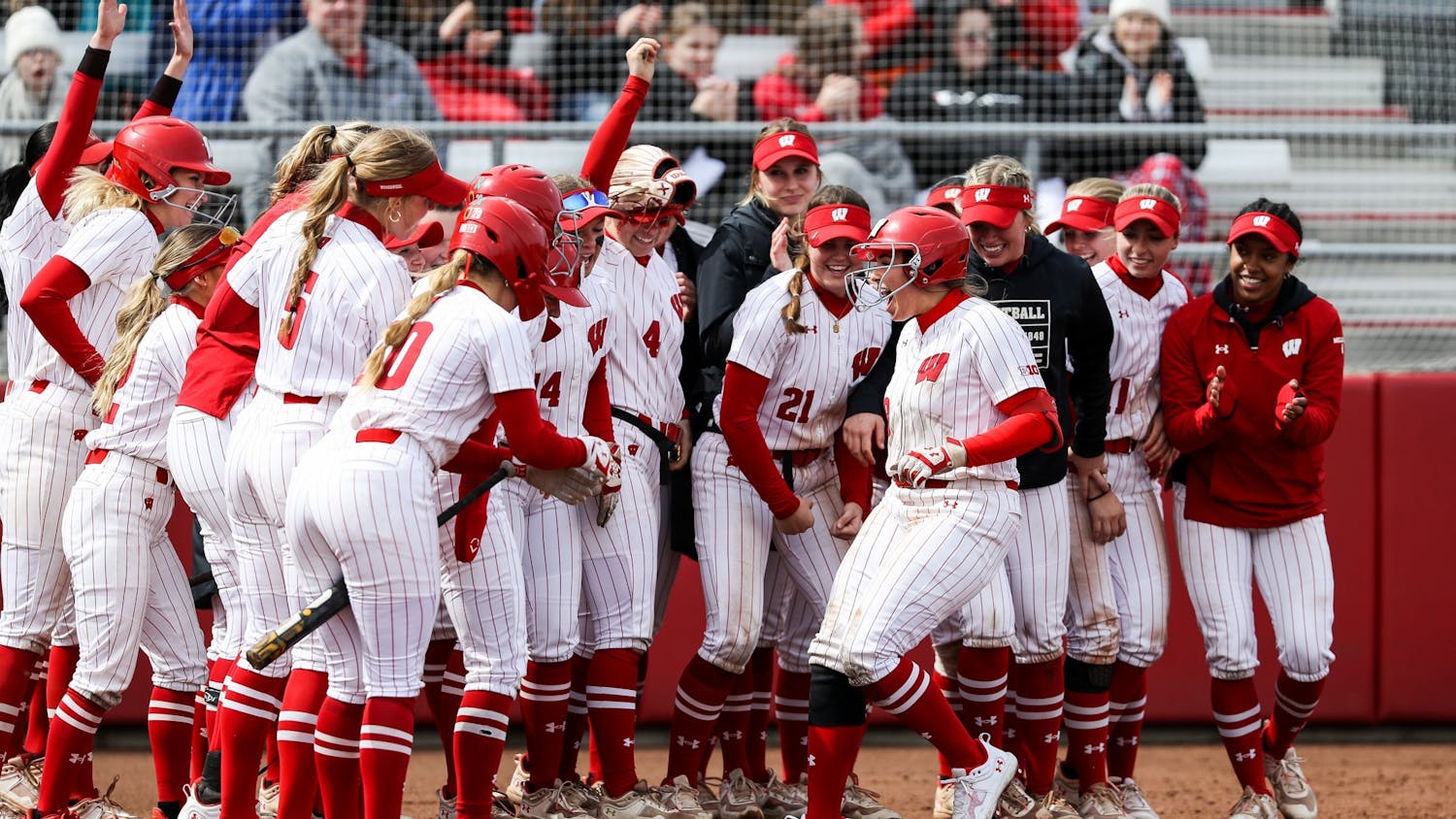Dominick Mersch stared down at the concrete floor of the Kohl Center as a sea of media personnel engulfed him. On Saturday, the fifth-year captain played his last game for the Badgers — a 7-4 loss to the No. 4 Michigan Wolverines in the Big Ten Tournament Quarterfinals. Two days later, he learned his longtime coach would be leaving the university with him.
The Badgers parted ways with head coach Tony Granato after seven seasons behind the bench. For many of his players, the move was a tough pill to swallow.
“I love Tony,” Mersch said, his voice soft. “He took me in as a young kid and helped each and every one of us develop into young men.”
As Athletic Director Chris McIntosh announced Granato’s firing in a Monday afternoon press conference, five Badger players sat in the back of the room. They attended to hear what’s in store for Wisconsin hockey, but more importantly, to pay respects to their coach.
Former Badger skaters additionally showed love to Granato. 2021 Hobey Baker Memorial Award winner and NHL first round pick Cole Caufield posted a picture of the pair golfing to Instagram with the heartfelt caption, “Always my coach.”
A reunion between Granato and Wisconsin seemed like a perfect marriage at the time of his hiring in 2016. While playing for the Badgers from 1983-87, the star forward became UW’s No. 3 all-time goal-scorer with 100 in 152 games. Following a 26-year playing and coaching career in the NHL, he chose to return to his alma mater over an assistant coaching job with the Detroit Red Wings.
“He's an amazing person,” McIntosh said of Granato. “He's an incredible Badger. He'll always have a place here and will be remembered that way. Nobody has given more to this program than coach Granato and his staff.”
Granato captured the hearts of just about everyone he interacted with in Madison. But decisions in sports aren’t made with the heart — they’re made with the head. And in this case, the resolution to find a new head coach was a no-brainer.
“We didn’t win enough,” Mersch said. “And that’s what it comes down to.”
The Badgers finished 105-129-16 and 65-87-2 in the Big Ten during Granato’s seven seasons at the helm. During this year’s make-or-break season in which improvements needed to be made, Wisconsin went 13-23-0 — the only team in the Big Ten not to have a record at or above .500.
When times were good under Granato, they were phenomenal. In 2016-17, the Badgers ended the season 20-15-1 and made the Big Ten conference championship game. Then in 2020-21, Wisconsin finished 20-10-1 and secured the conference regular-season title. Granato was named Big Ten Coach of the Year in both seasons.
But when times were bad, they were dreadful. Granato produced a losing record in five of his seven seasons, including 2021-22 in which the Badgers went 10-24-3 — the second worst record in UW’s 59 years of modern-era play. Due to Wisconsin’s recent poor performance, average attendance at the Kohl Center this season has dwindled down to 8,000, the lowest showing since 1971-72.
The recent results have hardly resembled the storied success that Badger faithful have come to look for from the hockey program. Wisconsin’s six national championships — the most recent coming in 2006 — ranks fourth best in college hockey history. With such a decorated legacy, expectations are always high.
Granato’s inability to consistently develop winning teams was ultimately his downfall.
“These are difficult decisions, especially when they affect people that you care about deeply,” McIntosh said while additionally referencing the firing of head football coach Paul Chryst. “The reality is, the programs that we're talking about are bigger than any one of us — me included. The expectations that we have necessitate difficult decisions to be made.”
Following Granato’s unceremonious exit, the Badgers will undergo an extensive national search to fill the gaping leadership hole. Wisconsin has employed just four hockey head coaches in the last 57 seasons, with the two most recent — Mike Eaves and Granato — being former UW players.
The athletic department’s coaching approach over the last two decades has more closely resembled a Hollywood script than a winning gameplan. After long stints in the big leagues, former star Badgers return to the cheese state to fulfill a fairy-tale ending and bring Wisconsin back to prominence.
Though Eaves garnered immense success during the early years of his coaching tenure, he compiled just 12 wins over his final two seasons before being released. The 2016 staff of Granato, Don Granato and Mark Osiecki — all past UW players that then-athletic director Barry Alvarez titled the “dream team” — didn’t fare much better in his relief.
As McIntosh begins the hunt for a new head coach, he must widen his search beyond the Badgers lineage tree. A divergence from the pool of Wisconsin alumni has already paid immense dividends for the football team, whose hiring of Luke Fickell over Jim Leonhard seems to be a resounding success in its infancy stages.
“This program has a lot to offer,” McIntosh said. “I’m confident we can attract a top tier coach with a proven track record of success.”
Granato gave all he had to Wisconsin, and he genuinely shouldn’t let the door hit him on the way out. But it’s time to find a new head coach — one that doesn’t already bleed cardinal red.






